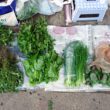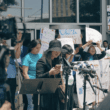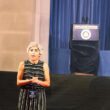Sign up here to receive The Yappie‘s weekly briefing on Asian American + Pacific Islander politics and support our work by making a donation.
Nearly a dozen Asian American and Pacific Islander (AAPI) advocacy groups are rolling out fresh policy demands to forefront the racism, sexism, and hypersexualization that target AAPI women on a daily basis.
Two months after a white man killed six Asian women in Atlanta, the National Asian Pacific American Women’s Forum (NAPAWF) and 10 other organizations have released a reproductive justice agenda aimed at providing “a roadmap for leaders and decision makers” on future investments in AAPI women.
The report comes after NAPAWF and The Harris Poll released a landmark survey which found that reproductive justice and health are a key issue for AAPI women.
“Reproductive justice was a term coined by a group of Black women who essentially decided and said the reproductive rights framework as a liberation framework for women is not enough,” said Sung Yeon Choimorrow, executive director of NAPAWF. “The original definition they came up with is a person’s right to choose if they want to parent, how they parent, and when they want to parent and how they parent the children that they have. It’s the if, when, and the how of parenting.”
Crediting civil rights advocate and scholar Kimberlé Crenshaw, the agenda emphasizes the need to advocate for all forms of liberation. Crenshaw originated the theory of intersectionality to frame the different systems of oppression—such as racism, sexism, anti-queerness, classism, xenophobia, etc.—and how they interact with and compound each other. She was a pioneer in the formulation of Critical Race Theory; the principles she outlined guide the organizations’ agenda.
“We are trying to move away from that model of saying we have to prioritize one part of our identity and struggle over another,” Choimorrow added. “None of these are negotiables and they all have to happen together. We are not going to be free and there is no justice until all of this is addressed. You can’t tell me today that I have to advocate for my rights as an immigrant, but my rights as a woman and a worker have to wait until tomorrow.”


Immigration reform, culturally competent resources, and language access programs are key priorities in the agenda, unsurprising given that roughly six in 10 Asian Americans are foreign-born.
Advocates’ wide-ranging demands include:
- Immigration reform that centers families, including a reduction in immigration backlogs that prolong family separation and an end to detentions and deportations of immigrants based on old criminal records.
- Accessible and affordable health care for all regardless of immigration status.
- Decriminalization of AAPI women’s bodies, which are subjected to “[r]acial profiling, surveillance, gender-based violence, violence in the workplace, criminalization of pregnancy outcomes and decisions, and religious persecution.”
- An increase in funding for AAPI communities working on responses to gender-based violence that don’t rely on cooperation with the criminal justice system.
- Economic opportunity and access for low-income AAPI families and communities, especially among women. The senior poverty rate for 12.9% for Asian Americans and 14.6% for Native Hawaiians and Pacific Islanders, both of which are higher than the national average, per NAPAWF.
- Securing protections for historical Asian American neighborhoods and boosting funding for Pacific Islander-led initiatives that support native populations on their homelands as well as displaced Pacific Islanders on the mainland.
- Ending U.S. militarism and the War on Terror while supporting impacted AAPI communities, including residents of the Commonwealth of the Northern Mariana Islands.
- Language access and a demand for all federal agencies to partner with AAPI communities directly to provide interpreters and translations.
- Data disaggregation by race and ethnicity in all federal agencies.
A NAPAWF poll released in April found that 8 in 10 AAPI women want their elected officials to better understand how their perspectives differ from other communities.
It’s why “specificity really matters when you’re trying to be trauma-informed,” said Ji Hye Kim, executive director of KAN-WIN, a Chicago-based organization that provides crisis intervention and case management programs for immigrant victims of domestic violence and/or sexual assault.
When working with populations requiring culturally competent care, “getting to know their stories” and having “cultural humility to really take in where they’re coming from” is essential, Kim said.
That approach needs to hit the mark within the AAPI community, too. Of the 11 organizations that crafted the 32-page policy platform, Empowering Pacific Islander Communities (EPIC) is the singular organization representing Pacific Islanders. Understanding the historical erasure of Pacific Islanders was key in EPIC Executive Director Tavae Samuelu’s decision to join the coalition.
The term “AAPI is still the mechanism through which power and resources are distributed … so my engagement for this particular platform is because it is genuine and authentically describes the relationship we have with each other,” Samuelu said during a virtual event introducing the agenda. “As [the Indigenous Australian activist and academic] Lilla Watson states, my liberation is tied up in yours. So when you call out AAPI, I hear a call for solidarity, so I’m going to show up.”
“Our communities are best situated to name the problem for themselves and not to have policymakers or anyone else tell our communities that they are the problem,” she continued. “We’re assets and not deficits. When it comes to solutions, we are also the best situated to create the most ethical solutions.”
President Joe Biden renewed the Presidential Advisory Commission on AANHPIs last month as part of an executive order revamping the White House Initiative on Asian Americans, Native Hawaiians, and Pacific Islanders. The commission is expected to advise the president on federal grantmaking and policies to “address the intersectional barriers that AA and NHPI women, LGBTQ+ people, and people with disabilities face,” per the White House.









